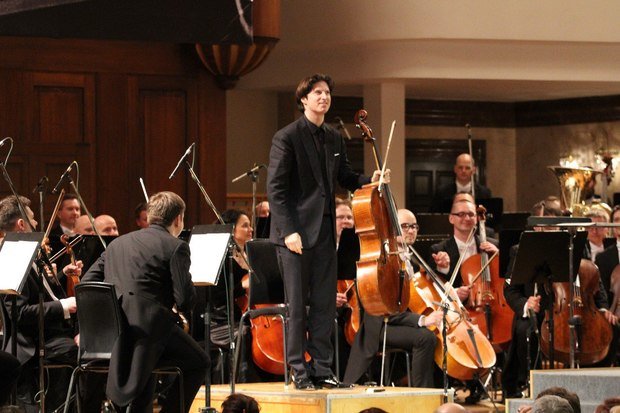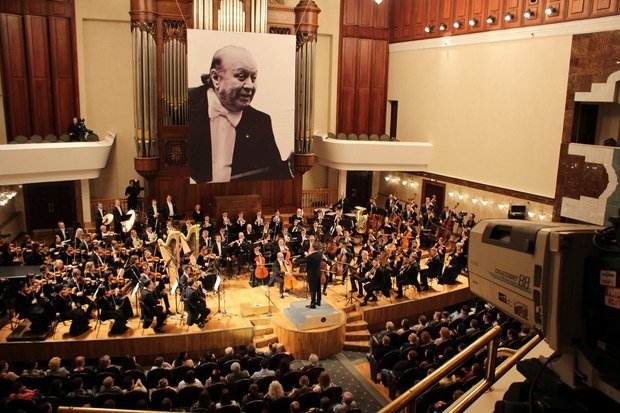Rakhlin Seasons festival: premonition and love
Another concert of the International Festival Rakhlin Seasons was held in the Saydashev State Great Concert Hall in Kazan. However, it would be wrong to call it just another. For the first time in the history of the Tatarstan National Symphony Orchestra, the TV channel of classical music, Medichi TV, broadcasted live a program conducted by Alexander Sladkovsky.
Triumph and pain
The arrival in Kazan of the TV channel Medichi TV in itself is already a sensation. It turned out that the concert of the Tatarstan Symphony Orchestra was broadcasted live throughout the whole world. And this is a serious promotion of one of Tatarstan cultural brands.
Another pleasant and significant event took place last week. Alexander Sladkovsky conducted several concerts with the orchestra of Santa Cecilia in Rome, soloed by Nikolay Lugansky. The programme included Russian music – the compositions by Rimsky-Korsakov, Rachmaninoff, Tchaikovsky. These Roman spring tours were the triumph of the Russian conductor.
That is why the beginning of the concert looked absolutely logical: at the beginning of the first part the orchestra easily and bravely performed Pomp and Circumstance Marche by English romantic composer Edward Elgar. The one about which Bernard Shaw said that Elgar in English music takes the same place as Beethoven in German music.
In general, the entire first part of the concert was devoted to the music of Sir Edward Elgar, who is not very often performed in Russia, and Kazan is no exception. The inclusion of his works in the programme of Rakhlin Seasons — this is a kind of reference to the experience of Natan Rakhlin, for whom educating the public, raising their good musical taste was one of the priorities. Now we can confidently say that the experience of Rakhlin has been adopted and successfully developed by Maestro Sladkovsky.

The march sounded, and the mood of the concert changed dramatically. Elgar's Concerto for cello and orchestra sounded. Famous German cellist Daniel Müller-Schott soloed, who at the time received the highest award in the youth competition named after P. Tchaikovsky. Müller-Schott is considered one of the best cellists in the world.
Elgar's Concerto for cello and orchestra was composed in 1919 under the impression of the tragic events of the First World War. For Elgar the usual order of things suddenly ceased to exist, the usual and calm Europe, he realized how fragile the world that surrounds us was. All these sad reflections resulted in his concert, which because of the unsuccessful first performance was not popular for a long time, and the audience really appreciated it only in the 1960s.
Naturally, that the programme of Rakhlin Seasons was compiled long before the concert, maybe a year earlier. But for some providential reason Maestro Sladkovsky performed the concert of the English romanticist on these disturbing days when the world seemed to be about to cross the fatal line.
The maestro was laconic and sad, as if afraid to disturb some fragile balance, some world order. And Müller-Schott's intellectual play seemed to emphasize the bitterness of the fate of those who suffered in the First World War, and the fear that everything, unfortunately, may repeat.
It is impossible without premiers
As it is known, Natan Rachlin loved premieres and generously gave them to Kazan citizens. As well as Alexander Sladkovsky does. During the season, we often see the remark ''the first performance in Kazan'' in the programmes for concerts. The recent concert was no exception. Within the framework of Rakhlin Seasons, the second part was given to Symphony No. 7 by Antonín Dvořák. Kazan heard it for the first time.

Dvořák wrote his Symphony No. 7 in 1885 — at a bad time in his life, when he had disputes with the publisher, when he had to promote his works, which were not always readily performed. Naturally, Alexander Sladkovsky goes from particulars to generals. For him, Symphony No. 7 is a conversation about the total loneliness of the man in the modern world. Existentiality comes through in the interpretation of Dvořák's symphony, and the maestro as if is being detached from worldliness, he is being self-absorbed and fatally lonely.
Elgar and Dvořák, two such different authors, who are united only by belonging to one direction in art — romanticism, coincided in the vision of Sladkovsky in his relation to human being. Just a human being, not a hero. One who depends on the elements, and from the vagaries of the powers that be. And the quintessence of what the maestro showed at the concert – it is love and affection for this person. It is fortunate that with the help of Medichi TV this humanistic message was seen by the whole world.